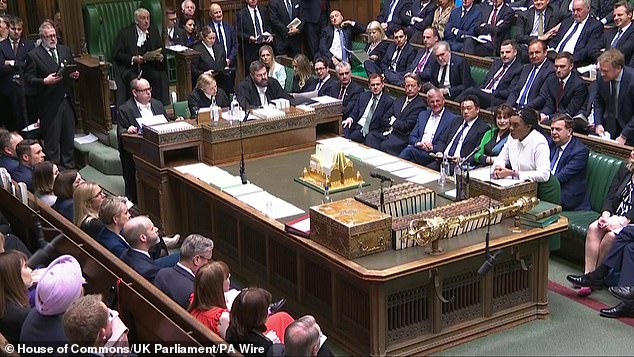Will the Conservatives survive as a major political force? I can hardly believe I have asked that question. They are the most successful party in human history.
They’ve been around since 1834 – longer if we include an earlier faction known as the Tories. Could they really go the way of the dodo, fax machines and floppy disks?
After last week’s local elections – in which the Conservatives lost every council they had controlled – their possible extinction no longer seems an idle thought. They were trounced by Reform UK, who did even better than expected.
An opinion poll yesterday highlighted the Conservative Party’s alarming predicament. YouGov put Reform at 29 per cent, Labour at 22 and the Tories at 17. These are not freak findings. They confirm a trend.
So what should the Tories do? Getting rid of Kemi Badenoch is one option, but few in the party have much appetite for that just now. The poor woman has only been leader for six months. Surely she must be given a chance. In any case, where is the candidate who would do much better?
Kemi may not be a fixture but the first thing the Tories must do is to come up with policies that convince voters they are capable of tackling the big challenges of our age.
And here, of course, there is already a dispute. Those on the Left of the party say it must cleave to the centre ground or it will lose votes in southern England to the resurgent Lib Dems.
Those on the Right say that they are being outflanked by Reform, which is thriving with policies that could justly be described as Thatcherite. The best way for the Tories to recover is to offer similar policies with greater conviction.

Kemi Badenoch may not be a fixture but the first thing the Tories must do is to come up with policies that convince voters they are capable of tackling the big challenges of our age, Stephen Glover writes

The Conservative Party leader takes the floor during Prime Minister’s Questions yesterday
They have just unveiled a so-called Deportation Bill, which they would introduce if re-elected. It assumes – rightly, of course – that Labour will fail to control mass immigration. It also acknowledges – again, correctly – that migration is the No 1 concern of numerous voters.
In fact, a poll before last week’s council elections found, in areas where they took place, that 67 per cent of respondents planning to vote Reform said that what mattered most to them are ‘national policies on immigration’.
Politicians who fail to grasp the pre-eminence of immigration as an issue are heading for a fall. This group includes Sir Keir Starmer, who is predictably failing to stem boats crossing the Channel (there are more of them) and has just signed a trade deal with India that is bound to increase the number of workers coming from that country.
Immigration has become a burning issue to a greater extent than before Brexit. Indeed, many people reasonably feel that Brexit has turned out to be a kind of betrayal because already high levels of immigration pre-2016 have doubled or even trebled in recent years.
The Tories are therefore right to nail their colours to the mast with a robust Deportation Bill. Although it essentially brings together previous ideas aired by Kemi, it shows how she would go much further than the Government.
It is also more specific than Reform, some of whose policies on immigration, though forthright, remain vague as to execution. For example, Nigel Farage’s party has implausibly said it will return illegal migrants to France without explaining how the French can be persuaded to take them back.
Kemi Badenoch is certainly offering a revolution with her ten-point outline Bill. There will be automatic deportation for anyone who arrives in Britain illegally. Foreign criminals will be sent packing. MPs will be asked to approve a legally binding cap on migration.
The putative Bill also envisages ‘disapplying the Human Rights Act from all immigration matters’. This means that lawyers would no longer find it easy to frustrate the deportation of illegal immigrants or foreign criminals under legislation misguidedly introduced by Tony Blair’s administration.
But does this go far enough? Should the Tories commit to withdrawing from the European Convention on Human Rights (ECHR), whose court made a legally inept judgment that threw a log in the way of the last government’s plan to send illegal migrants to Rwanda?
Richard Ekins, a law professor at Oxford and head of the Judicial Power Project at the admirable Policy Exchange think-tank, believes that withdrawal from the ECHR might be ideal. But disapplying the Human Rights Act would be a good start.
This is because it would immediately exclude numerous vexatious cases in our own courts. The European Court of Human Rights tends to be drawn out in its deliberations, and less coercive than domestic courts. Its rulings, though technically binding, can be evaded.
Nevertheless, the Tories should – like Reform – advocate pulling out of the ECHR. They fear the political consequences of doing so, and in particular of being compared to Russia, which was expelled from the ECHR in 2022. Yet civilised countries such as Canada, Australia and New Zealand are not members.
This is all highly theoretical, of course. The Tories are in no position to introduce a Deportation Bill in the foreseeable future, and may never be. Their immediate challenge is to convince voters that they will tackle immigration with the same determination as Reform. Declining to leave the ECHR implies weakness.
There is an even bigger problem for the Conservatives, which is that people will understandably ask why during 14 years of office they failed to introduce any of the measures that now form part of its Deportation Bill.
This is Kemi Badenoch’s difficulty across the board. Reform promises substantial tax cuts plus huge extra investment in the NHS, while cheerfully advocating the nationalisation of British Steel. Yet voters seem not to worry that Nigel Farage’s sums don’t add up.
If Kemi were to promise huge tax cuts – which I pray she one day will – many people would say that at the end of 14 years the Tories had raised taxes to their highest level in British peacetime history. Why should we trust them again?
Why should we believe the Tories, who allowed welfare spending to balloon in their latter days, if they come forward with a programme to reduce sickness benefit and encourage people back to work?
At Prime Minister’s Questions yesterday, the Conservative leader pointed out the shortcomings of the Government’s Net Zero policies only to have her own enthusiastic support for renewables while in office quoted back to her by Sir Keir Starmer.
The weight of those 14 years is a heavy burden on Mrs Badenoch’s shoulders. Only the passing of time, and fading memories, are likely to lift it. Even then, some won’t forget or forgive.
But the Tories can only try. Their best hope is not to be a kind of ‘Reform-lite’ but to champion policies that are authentically Tory – I would say Thatcherite. The higher Reform and Nigel Farage rise, the more their weaknesses and contradictions will be exposed.
All the same, it will be a long and hard road for the Conservatives. Their Deportation Bill – ignored though it was by the BBC and many media outlets – is an impressive first step in the party’s path back to power.












